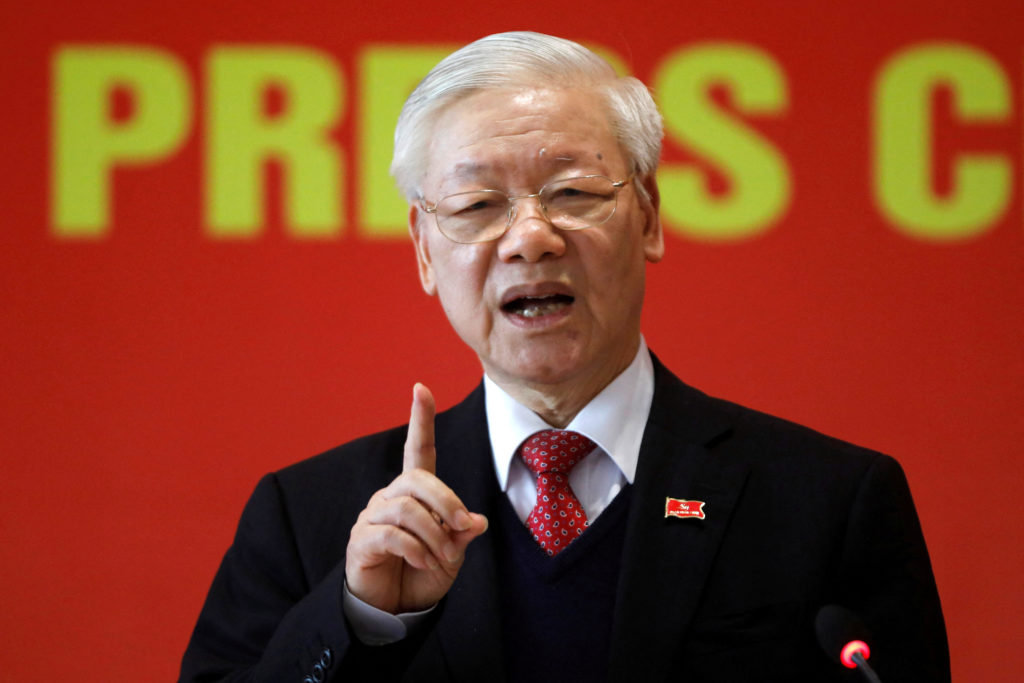Politics
Vietnamese Leader Nguyen Phu Trong Passes Away, Leaving a Political Vacuum

Nguyen Phu Trong, the revered general secretary of Vietnam‘s Communist Party and a powerful political figure in the country, has died at the age of 80 following a lengthy battle with health issues, according to official reports from state media on July 19, 2024.
The Nhan Dan newspaper confirmed that Trong passed away at 13:38 local time at the 108 Central Military Hospital. His death marks a significant turning point in Vietnamese politics, given his dominance in the political landscape since he was appointed party chief in 2011.
Trong’s leadership has been characterized by a strong commitment to reinforcing the Communist Party’s authority within Vietnam’s singular political framework. His ascent to power had come during a time when the governmental sector led by then-Premier Nguyen Tan Dung began to overshadow the party, prompting Trong to refocus the balance of power back to the party’s influence.
Born in 1944 in Hanoi, Trong dedicated his life to Marxist-Leninist principles, obtaining a philosophy degree before joining the Communist Party at a young age. He consistently regarded corruption as the most pressing issue threatening the party’s legitimacy and governance, emphasizing the necessity of discipline to maintain order and stability.
In 2016, after being reelected to lead the party, he famously stated, “A country without discipline would be chaotic and unstable.” His tenure further solidified the perception that while Vietnam officially lacks a singular top leader, the party chair is effectively the most authoritative figure.
Trong initiated an extensive anti-corruption initiative referred to as the “blazing furnace,” targeting both political and business elites. This anti-graft campaign saw the punishment of thousands of party members, including notable figures such as former presidents Nguyen Xuan Phuc and Vo Van Thuong, along with Vuong Dinh Hue, the previous parliamentary leader. A total of eight Politburo members faced expulsion due to corruption allegations, a stark contrast to the zero accountability from 1986 up until 2016.
The United Nations Secretary-General Antonio Guterres expressed condolences over Trong’s passing, describing him as a key figure in Vietnam’s recent historical context. Guterres recognized the country’s remarkable economic progress and its growing engagement as a significant global partner during Trong’s leadership.
Having studied in the Soviet Union between 1981 and 1983, speculations arose that Trong would steer Vietnam toward closer ties with Russia and China—a notion he seemed to reject in favor of a pragmatic approach termed “bamboo diplomacy.” This concept illustrated Vietnam’s flexibility in navigating complex geopolitical dynamics while maintaining significant ties with China amidst disagreements over territorial claims in the South China Sea, as well as strengthening its relationship with the United States.
Despite prominent advances, Trong’s legacy is viewed as mixed; the sweeping anti-corruption measures inadvertently undermined various institutions within the Communist Party, prompting concerns about an increasingly personalized form of governance, reminiscent of China’s political dynamics. As observed by Nguyen Khac Giang from the ISEAS-Yusof Ishak Institute, this shift has rendered party norms and mechanisms tenuous, leading to heightened competition for power amid the absence of institutional checks.
Following Trong’s deteriorating health, President To Lam was appointed as the caretaker of the party a day prior to Trong’s passing. Lam, who was pivotal in the anti-corruption campaign, assumed presidency in May after his predecessor resigned in response to corruption allegations.
The Politburo subsequently tasked Lam with overseeing essential party operations, a move indicating preparations for leadership transitions amid legitimate concerns regarding Trong’s health, which had been under speculation since his hospitalization in 2019. Observers noted that he appeared frail during a meeting with visiting Russian President Vladimir Putin, with the government previously announcing his need for focused medical treatment.
His demise leaves a significant leadership void in Vietnam, with many speculating that Lam will likely ascend to the leadership position previously held by Trong. Yet, political analysts predict uncertainty in the country’s political atmosphere, describing the prevailing state of the Communist Party as “very shaky” due to a lack of viable successors exacerbated by numerous purges amid corruption probes.
The central committee of the Chinese Communist Party also sent condolences to their Vietnamese counterparts and expressed deep mourning for Trong’s death, signifying the importance of regional relations amidst political transition in Vietnam.












